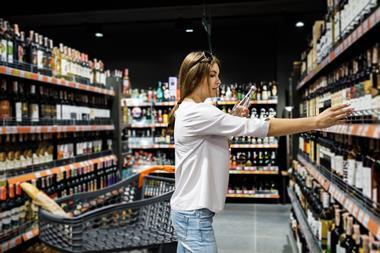What’s in store for 2014? With competition heating up in the convenience sector and the prospect of legislation across key categories threatening to squeeze margins further, independent retailers need all the help they can get in 2014. Some are looking to the future and utilising technology to help their business thrive, while others feel that strength in numbers is key to survival and are increasingly working with other retailers.
Whatever your strategy is, or the challenges facing you in 2014, the industry agrees that the next 12 months will be an opportunity for independent retailers to become part of their local community and provide the level of service that the multiples fail to. Here C-Store speaks to key figures within the industry about their predictions for 2014.
Collaborating with suppliers is vital to success
Katie Hemmings, HIM senior client director:

“From speaking to independent retailers, we know next year will still be extremely challenging as competition from every angle continues to intensify. In particular, we are going to see discounters fight even harder to win the top-up shopper from c-stores and they will shout louder about their fresh credentials and improved store environment and product quality.
“I have no doubt that progressive indie retailers will rise to this challenge and deliver! We will see success where they truly understand how to deliver against their shopper needs at different times of the day and week to increase loyalty and basket spend.
“HIM will be working with indie retailers to help develop some sophisticated meal solutions, and improve the ROI on their fresh range and hot drinks offer to keep up with competition. But the message we always stress and which will be no different in 2014 is to get the basics right. Great range, price and availability of core CTN categories will still be the key to driving footfall.
“Our continued advice to retailers is to make sure you utilise your supplier support. There are some great initiatives being driven by suppliers, but you need to encourage them to work collaboratively with a category approach - it really pays off.
“Finally, the USP that independent retailers can always leverage is the outstanding customer service they can deliver, along with the strong community involvement. We have seen some really innovative projects executed this year including offering free fruit to local schools and getting kids into the store to create their own flavour of sausage that will be sold.
“We will continue to see retailers think smart in order to compete with supermarkets and discounters, so watch this space.”
Focus on your own strengths to grow in 2014
Daniel Quest, Costcutter Supermarkets Group retail director:

“The economy is improving steadily, albeit at quite a slow pace, and the outlook for 2014 shows this trend continuing. This improvement is yet to really make its way into consumers’ pockets and they remain quite measured in their spending. Customers are continually seeking out value, not just through strong promotions, but also by purchasing a wider range of products and trading up or down to achieve value or treat themselves.
“Seasonal spending has increased as customers look to treat themselves on key occasions throughout the year. This is a growth area and one where we have worked hard to deliver excellent promotions to drive members’ sales.
“The multiple operators will continue their focus on growing their share of the convenience sector. Independent retailers should not simply try to compete with them on price alone, but take advantage of their own strengths and deliver added value to customers in other ways. From ordering in specific products for customers, providing home delivery to elderly customers, or by truly integrating themselves into the local community, independent retailers can offer much more to the customers and communities they serve.
“2014 is a hugely exciting year for Costcutter Supermarkets Group and its members as we complete the transfer to the new supply chain system. With control of our buy and supply we can give our retailers an enhanced package, through an improved range, pricing and promotional offer, as well as building further on the wider retail support services we provide to help retailers continue to grow their stores.
“The full rollout of our new Independent own brand is a central pillar of this and the three-tier structure will allow retailers to tailor their own brand range to meet the exact needs of their customers and provide the opportunity for them to trade up or down as they wish, while preserving retailer margins.”
Remain at the heart of the community
Amanda Jones, Nisa chief operating officer:

“The convenience retail sector is very competitive, with symbol groups and the multiples all wanting to increase their presence in this market. While the trading environment will improve slightly for independents in 2014 as the green shoots of an economic recovery start to be evident, the increase in competition will still make it tough.
“The biggest challenges in 2014 are two-fold: combating the strength of multiple retailers and discounters encroaching on the traditional independents’ space and managing the costs of running a small business. It is a constant battle for retailers to meet the promotional low-pricing activities of the multiples while delivering a profitable margin.
“Despite the competition, independent retailers can set themselves apart by delivering a personal and localised service and being at the heart of their communities. At Nisa, each store is independently owned, which allows the store to be tailored to meet the needs of the local community, and the independent retailers and their staff can create a familiar and friendly in-store experience which other competitors can’t.
“In 2014, Nisa is planning on simplifying its business to make it easy for retailers to grow and develop. We are changing to become more consumer focused by establishing a new marketing function to increase brand awareness among consumers and new business units which will specifically focus on the different needs of our symbol and our independent and specialist members.”
Beware the threat from the discounters

Debbie Robinson, Spar UK managing director:
“It’s been a great year for Spar, with the organisation realising all of its financial goals. Our Spar stores are outperforming the convenience market place in bakery, horticulture, chilled and fresh products. We are also seeing sales rise thanks to our robust national multimedia campaign, and retailer recruitment is at its most buoyant for years due to the great efforts of all our teams around the country.
“Achieving like-for-like sales growth is challenging for everyone at the moment, but we believe there is an opportunity to boost sales by carrying out space and ranging reviews. There is also more competition than ever from multiple convenience stores and discounters offering a credible range across all categories. We are confident our retailers can offer a lot of value and create an element of discount to help meet this demand.
“We are helping our retailers to be more successful than ever in 2014. We will continue to reduce the cost of goods and improve our price perception, cementing our position as offering fantastic value at the £1 price point. We will also continue to increase penetration of our Spar brand range, and to boost fresh produce in stores, and we are in discussions with the Post Office, Subway and Costa Coffee about installing units in many sites. With so many individual successes taking place at Spar stores across the country, we’ve built great momentum for 2014.”
Time to embrace technology in c-stores
Arjan Mehr, Londis Bracknell, Berkshire:

“You can take the doom and gloom approach for next year, but I believe retailers need to engage more professionally as the multiples enter our sector at a rate of knots. The situation isn’t lost, though, as only Tesco seems to have its convenience offering right, with the others still finding their feet.
“Retailers who are worried about 2014 should consider joining a symbol group if they’re not already part of one. It provides a cost-saving to retailers and offers essential support. We should also use 2014 to reposition ourselves as more than ‘booze and fags’ stores, which I believe will be vulnerable in the near future. Retailers should look to grow their offering beyond alcohol and tobacco to anticipate any drops in revenue stream, and if sales in these categories do remain stable then you’re ahead.
“It’s also important that retailers remember that they can’t be all things to all people and they shouldn’t attack the multiples on price alone. If price is the only credibility you have, then you’ll fail. Focus on what makes your store unique and don’t be afraid to think outside the box.
“We need to look at technology and how it can help us. I believe contactless payment will play a very big part in 2014. All the multiples are using it and the benefits are clear. It’s cheaper than credit/debit card payments and will speed up service in stores. It’s a technology that’s here to stay and retailers should get on board with it.”
Engagement is key to victory for retailers
James Lowman, Association of Convenience Stores chief executive:

“Competition will become even more intense in 2014. Retailers not trading alongside a multiple-owned c-store should expect this competition to arrive soon. And pressure will also come from less obvious sources: discounters, food service operators and specialists all offering convenience products and seeking to appeal to your customers. Unfortunately, legitimate retailers are also suffering from competition with the illegal trade in tobacco and alcohol, and we need more action against the criminals who drive this.
“The ACS quarterly Voice of Local Shops survey consistently shows independent retailers to be optimistic about the future, even when sales and profits are flat. There is growing optimism in line with the improving economy, and the trends towards smaller households and consumers top-up shopping more frequently are continuing, which is good news for c-stores. The market is extremely competitive, but there is plenty of opportunity in the sector.
“Community activity remains a point of difference for independents, with 84% of them engaging in some form of community activity. However, multiples can also sponsor local activities and collect money for charities, so the opportunity for independents is to engage far more deeply with local campaigns, decision-makers and community life - we term this civic leadership. There’s also an incentive for retailers to act as civic leaders in a community as more policy that impacts on local shops gets made locally, so building good local relationships to influence these decisions is increasingly important.
“Our focus remains on lobbying effectively from the inside of government for members’ interests, providing advice on regulatory compliance and best practice, and offering great networking opportunities. Our objective in 2014 is to get more retailer engagement in all of this activity.”
Make your stores work harder in 2014
Paul Cheema, Malcolm’s Stores, Coventry:

“It’s going to be more challenging in the coming months. Research is showing that the big four are losing shoppers and they’ll be looking to our sector to make up for that. Perhaps the biggest challenge will be for retailers looking to secure units, as the multiples are snapping them up quickly. Retailers will have to be proactive and start working with agents to secure the sites that will help them grow their business.
“Retailers need to start making their stores work harder in 2014 they need to focus on point of entry and point of exit sales to get that extra sale. They also should be drilling into data they’re collecting through their epos systems and using it to inform their business decisions. Collectively, independent retailers need to start sharing best practices with each other. There’s no point in seeing another independent retailer as the competition the competition is the multiples, and to beat them we need to work together.
“Digital will also be very important in 2014. Most people have smartphones so we’ve installed a QR code reader that will improve engagement. We’re also trialling electronic shelf-edge labels to see if it improves the business.
“Most importantly, we should remember that independent retailers are community retailers and we need to be there for our customers. We need to ensure that store standards remain as high as they are or even improve, and continue to focus on the key elements that make us unique: price availability and speed of service.”
Use data as a weapon in 2014
James Bielby, Federation of Wholesale Distributors chief executive:

“The economy is picking up, but it’s not going to change trends significantly over the next year. However, 2013 was a watershed in that we saw the big supermarkets’ expansion plans stutter for the first time. While that might sound good for independents, the downside is that the big chains are switching their focus to smaller formats and the convenience sector.
“The best response to this threat is to be as good as them in every department and better in most. Working with your wholesaler will give you that advantage - they will help you identify your points of difference, and advise on marketing your business as a different proposition to the chain down the road. Crucially, they will ensure that you are price competitive on the products you have to be, and offer you different, tailored ranges on others. They will help you provide a service that suits your customers’ needs.
“The key to success in 2014 is data: collecting, analysing and sharing what you know about your customers, to improve your service to them, and your wholesaler’s service to you. Many independents underuse their epos and far too many haven’t yet adopted it. The pace of change is now such that you risk being left behind if you don’t embrace the technology, and your wholesale partner is on hand to help with the transition. You will be amazed how better data management will transform your business.”
Adapt to the challenges of a changing market

James Walton, IGD chief economist:
“The UK economy is, at last, beginning to show signs of recovery, although this has so far proven weak and patchy. Shopper spending power will remain under pressure for the foreseeable future and trading conditions for food and consumer goods retailers will be challenging.
That said, IGD’s ShopperVista research shows that shoppers are taking notice of
more positive messages about the economy - interest in new products and better shopping solutions is beginning to return.
Distinctive ranges, local targeting and superior customer service are traditional strengths of the independent retail trade and these will be critical as the recovery gathers pace, but traditional skills will not be enough - there is a need to innovate.
“The UK’s shopping landscape is changing and smaller operators must adapt. Supermarket operators have identified omnichannel retail as an opportunity and they will invest heavily to make it a reality.
“Omnichannel means using technology to combine multiple routes to markets - large stores, small stores and online - into a single network, with the aim of capturing all shopper transactions, irrespective of time and spatial factors.
“The potential threat of this to independents is clear. One possible response is to form alliances with independent partners from other markets in order to offer a similar level of convenience to shoppers (for example, by offering pick-up points for goods ordered online).
“Independents will still have a role to play in the new landscape, but if retailers wish to remain relevant to tomorrow’s shoppers, then ‘independent’ must never be another word for ‘isolated’.”






















No comments yet